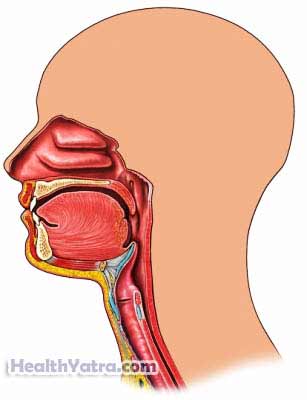تعريف
Dysarthria is a speech disorder that affects the muscles of the face, which become weak, move slowly, or do not move. It differs from aphasia, which is a language disorder.

أسباب
This condition can be caused by not being able to control and coordinate the muscles that you use to talk. This can result from:
- سكتة دماغية
- ورم في المخ
- Brain trauma
- العدوى
- Conditions that paralyze the face or cause weakness, such as Bell’s palsy
- Degenerative brain disease, such as:
- مرض الزهايمر
- Amyotrophic lateral sclerosis (ALS)
- تصلب متعدد
- Huntington’s chorea
- مرض الشلل الرعاش
- Neuromuscular disease, such as:
- Cerebral palsy
- تصلب متعدد
- Muscular dystrophy
- الوهن العضلي الوبيل
- Alcohol or drug abuse
- Surgery on the tongue
- Weakness of the tongue
- Structural problems such as not wearing your dentures
- Side effects of medications that act on the central nervous system
عوامل الخطر
Factors that increase your chance of developing dysarthria include:
- Being at high خطر الإصابة بالسكتة الدماغية
- Having a degenerative brain disease
- Having a neuromuscular disease
- Abusing alcohol or drugs
- Being older and having poor health
أخبر طبيبك إذا كان لديك أي من عوامل الخطر هذه.
الأعراض
Symptoms of dysarthria include:
- Speech that sounds:
- Slurred
- Hoarse, breathy
- Slow or fast and mumbling
- Soft like whispering
- Strained
- Nasal
- Suddenly loud
- سيلان اللعاب
- Difficulty chewing and swallowing
التشخيص
Your doctor will ask about your symptoms and medical history. A physical exam will be done, paying close attention to your:
- Ability to move your lips, tongue, and face
- Production of air flow for speech
Images may be taken of your brain. This can be done with:
- تصوير الرنين المغناطيسي
- الاشعة المقطعية
- فحص الحيوانات الأليفة
- Single-photon emission التصوير المقطعي (SPECT) scan
- Swallowing study, which may include x-rays and drinking a special liquid
The electrical function of your nerves or muscles may be tested. This can be done with:
- دراسة التوصيل العصبي
- Electromyogram
العلاج
تحدث مع طبيبك حول أفضل خطة علاجية لك. خيارات العلاج تشمل ما يلي:
- Addressing the cause of dysarthria, such as stroke
- Working with a speech language pathologist, which may focus on:
- Doing exercises to loosen the mouth area and strengthen the muscles for speech
- Improving how you articulate
- Learning how to speak slower
- Learning how to breath better so you can speak louder
- Working with family members to help them communicate with you
- Learning how to use communication devices
- Safe chewing or swallowing techniques, if needed
- Changing medicine
الوقاية
To help reduce your chance of getting dysarthria, take the following steps:
- Reduce your risk of stroke:
- اتمرن بانتظام.
- Eat more fruits and vegetables. Limit dietary salt and fat.
- إذا كنت تدخن ، توقف عن التدخين.
- يحافظ على a healthy weight.
- فحص ضغط الدم في كثير من الأحيان.
- Take a low dose of aspirin if your doctor recommends it.
- Keep chronic conditions under control.
- Call 911 if you have symptoms of a stroke, even if symptoms stop.
- If you have an alcohol or drug problem, get help.
- Ask your doctor if medicines you are taking could lead to dysarthria.
الكلمات الدالة :
Dysarthria Definition, Dysarthria Causes, Dysarthria Symptoms, Dysarthria Complications, Dysarthria Surgery Cost in India, Dysarthria Treatment Hospital in India, Dysarthria Treatment in India, Dysarthria Doctors in India, Dysarthria Meaning in Hindi, Dysarthria Meaning in Bengali, Dysarthria Meaning in Arabic, Dysarthria Treatment cost in 2024, Dysarthria Hospital in India, Dysarthria Treatment Near Me, dysarthria treatment, dysarthria treatment exercises, dysarthria causes, 7 types of dysarthria, hypokinetic dysarthria, dysarthria symptoms, medications that cause dysarthria, flaccid dysarthria treatment
